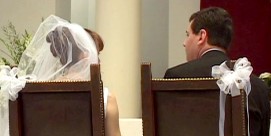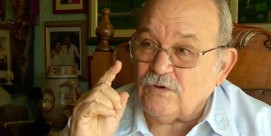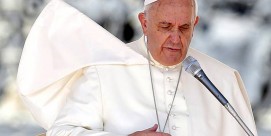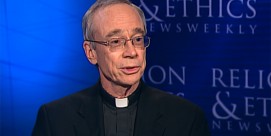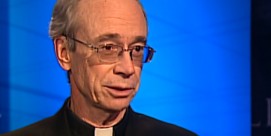In This Episode << SLIDE LEFT TO SEE ADDITIONAL SEGMENTS
Cardinal Carlo Martini
BOB ABERNETHY, host: Cardinal Carlo Martini, former Archbishop of Milan, died last week from Parkinson’s disease. He was 85 years old, a Jesuit, biblical scholar, sometimes mentioned as a future pope. He was known as a rare liberal voice in the Catholic hierarchy. One of the cardinal’s many friends was the scholar and writer Harvey Cox. He is the Hollis Research Professor of Divinity at Harvard University. Professor Cox, welcome.
PROFESSOR HARVEY COX (Hollis Research Professor of Divinity, Harvard University): Thank you. Glad to be here.
ABERNETHY: As you remember your friend Cardinal Martini, what stands out? What were his outstanding characteristics for you?
COX: The first thing that comes to mind is the kind of graciousness, intelligence. He was a scholar before he was a bishop or an archbishop or a cardinal. Enormous curiosity; his eagerness and willingness to listen all around to all different kinds of people and to learn, but mainly I think just the word “grace.” You know, it’s customary to call bishops, I think, “Your Grace.” Sometimes it fits, and sometimes it doesn’t, but with Martini it certainly did. He was a gracious and open and personable man.
ABERNETHY: And in a gentle way, you have said, I think, in a gentle way, pretty critical of the Catholic Church. He told an interviewer a few weeks ago, I read, that he thought the Church was 200 years behind the times. How did he want it to change?
COX: Yes, one of his great gifts, I think, was to be thoughtfully critical without being polemical. He could raise issues in a way that didn’t make him any enemies, but he had a lot of interests in, first of all, his main big interest was to what he called decentralize a church which has become enormously Rome-centered in the last 200 years or so of Catholic history and to enlist the energy and creativity of all the different parts of the world. The Catholic Church is a universal church. There are Catholics on every continent now with growing numbers in Africa and Asia.
ABERNETHY: He also proposed discussion at least of some really controversial matters such as ordaining women deacons, or no longer requiring priests to be celibate.
COX: That’s right. He wanted to at least raise the question for further discussion about priestly celibacy, about required priestly celibacy, about women as deacons, about conversations with other religious traditions in a more serious way. But my point is that he had these positions, but he had them in a way that was persuasive and open and always in the tone of inviting discussion and not staking out a position. I think that was Martini’s great strength.
ABERNETHY: Did he seem to you the last liberal cardinal in the Catholic hierarchy?
COX: You know, I think in some ways the word “liberal” doesn’t quite capture Martini. He avoided labels, and he wanted to be a voice in the Church for a very large segment, he thought, of the Church and not just one little, tiny wing. I would call it the open, ecumenical, forward-looking, visionary wing of the Church that doesn’t always just look back to the way it was, but has a vision for the future. That was really his strength.
ABERNETHY: And, quickly, what was the Vatican reaction to these suggestions that he made? Did they think that he was kind of off the reservation?
COX: It was pretty much to ignore them. He was never overtly disciplined or condemned. He was always listened to, but nothing really ever happened, and I think that was because the direction that the leadership of the Church was going in Rome at the time was not in accord with many of the ideas that Martini had, alas.
ABERNETHY: Harvey Cox of Harvard University, many thanks.
COX: You’re welcome.

